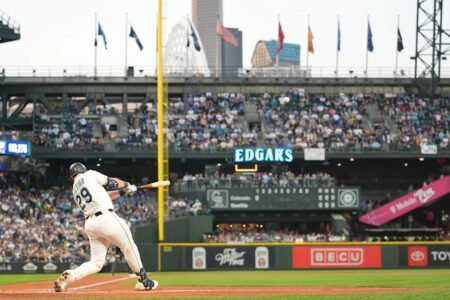On Wednesday night against the Cleveland Guardians, Tigers first baseman Spencer Torkelson stood stunned as he watched a routine ground ball spin off his glove and into right field. Later, his teammate, catcher Dillon Dingler, doubled over in disbelief after an innocent foul pop up plopped off his mitt and on to the dirt. These were some of the low-lights of yet another Tigers loss, their eighth straight, a defeat which dropped them completely out of first place for the first time since April, shortly after the 2025 season began.
Collapse is not a powerful enough descriptor to characterize Detroit’s sudden and dramatic downfall, which we’ll get to momentarily. But first, some housekeeping. With three games to go of the regular season, the Tigers and the Guardians are tied for first place in the AL Central, but Cleveland own the tiebreaker as they have the better head-to-head over the course of the season. The Tigers do hold a one-game lead over the Houston Astros for the final wildcard place, but if their collapse continues and the Astros do well in their final games, Detroit would be in serious trouble. For the Tigers, who were skating towards the playoffs with a 9.5-game lead in the AL Central with just 16 to play as recently as 10 September, there are three ways their regular season could end. On Monday morning, their fans could wake up dazed but with a division title, sputtering “it was all just a terrible dream.” Or Detroit could be preparing for a humiliating but somewhat face saving wildcard series. The third option, in which the Astros overtake them and the Tigers miss the postseason altogether, is that the franchise becomes the holder of what is arguably the most catastrophic late season collapse in nearly 150 years of Major League Baseball.
Advertisement
Related: Guardians’ David Fry suffers facial fractures after being hit by 99 mph fastball
At this point, one thing we can definitively say is that these once promising young Tigers are in dire need of a break. By that I mean for a few bounces to go their way, and a couple of days to set their heads straight. Except baseball doesn’t work that way. As Earl Weaver, Baltimore’s Hall-of-Fame manager once told Washington Post writer Thomas Boswell, “This ain’t a football game, kid. We do this every day.”
And it’s that baseball schedule, a 162-game slog that starts in the thaws of March and ends in the early frosts of late September, that is at least partially responsible for the history that made the 1964 Philadelphia Phillies and the 2007 New York Mets the benchmarks for late season swoons. The sheer volume of baseball games in a season opens the door for graphics like this, which claims (ridiculously) that on that same 10 September, Detroit had a 100% chance of making the playoffs. Now they don’t know if they’re going anywhere other than Cancún. This couldn’t happen in most other sports, where, for example, a four-game divisional lead in the NBA feels like eight, and, well, a division title really doesn’t matter and sliding down a few seeds has minor consequences.
In the pre-division MLB alignment up of 1964, when the Phillies blew their 6.5 game lead with 12 to play, the result was brutal: a blown National League pennant. In the wild card era of 2007, when the Mets, who are on the verge of making their own piece of miserable history this season, blew a seven-game lead with 17 to play, they wound up missing out on the playoffs entirely. If the Tigers earn a wildcard berth over the Astros, they’ll be forced to play, guess who, the Guardians in a three-game series, and all those match-ups will be played in Cleveland.
Advertisement
And yet, with such a long season, streaks of such malaise are not unheard of, even for strong teams. The 2000 New York Yankees finished the season 3-14 and went on to win their third World Series title in four years. So when AJ Hinch’s Tigers, a relatively young, inexperienced club, slumped to a 1-14 stretch in July, was it unnerving? Yes. But then they righted the ship and hit their high-water mark of 25 games over .500 on 23 August. Criticism of team president Scott Harris – who passed on adding a big bat to protect the farm system despite a good but not great lineup – quieted once the team turned things around. Now? Well, it’s a different story altogether, with the once celebrated Harris being universally vilified by the locals.
With soon to be multi-Cy Young Award winner Tarik Skubal under team control for just one more year and the team on the verge of making the wrong kind of history, all of the franchise’s recent accomplishments are on the verge of being cast in the darkest shadow baseball can offer. Their unexpected playoff run in 2024? Owning the best record in baseball earlier this season? Sending six players to the All-Star Game? The reclamation of all-star Javier Baez (once considered one of the worst free agent contracts in baseball history)? yet another incredible season from Skubal? Torkelson, the former No 1 overall draft pick, who wasn’t even guaranteed a starting place in Spring Training, finally fulfilling his potential? Right now, that’s all gone.
Instead, the city of Detroit is deep into the full-blown panic that takes over when a sports plague sucks up every ounce of oxygen available. Tuning into local sports talk radio for just five minutes on Thursday revealed hosts and callers arguing over whether it’s better to miss the playoffs altogether rather than suffer the embarrassment of a wildcard series. One host decried that the “anything can happen in the playoffs” mantra sounded a lot like “trying your luck as a 16th seed in an NCAA basketball tournament.” Gulp.
“To be honest, people are embarrassed by it, because you take pride in your city,” says Deadline Detroit journalist Allan Lengel (disclaimer: yes, he’s a relation). “And so this is another national embarrassment, and we’re kind of hoping that nobody in other cities is paying attention, but, you know, I’m getting little notes from people: ‘Oh my God … what’s going on with the Tigers?’”
Advertisement
What’s going on is that their fanbase is so low, they can’t begin to imagine the team winning another game, and that’s in a sport where you can run into a win here and there almost by accident.
All that said, for a collapse of this type to unfold, it does take two to tango, and what Cleveland have pulled off is nearly as remarkable. On 4 September, the Guardians were in third place with a 69-70 record, 11 games behind Detroit – only slightly better than their 15.5 game July deficit. Then, just as the Tigers were gearing up for their sudden slide, Cleveland put together a run of 19 games where they won all but two games and outscored their opponents 86 to 32, while posting a 1.35 ERA, a truly jaw dropping set of results.
That staggering run came to a close on Thursday night, with Detroit snapping their slide, moving back into a dead heat with their rust-belt rivals. But as it’s been with the September version of the Tigers, even the good news isn’t good: Cleveland own the tiebreaker, so even when Detroit is even, they’re still effectively in second place. To finish the season, Cleveland are at home to Texas, who have nothing to play for while Detroit head to Boston whose games should still matter as the AL playoff picture takes form.
What’s good? Well, maybe it’s that Detroit, a city that’s had its share of both real life and sports setbacks, is back in a more familiar place – as underdogs.
Read the full article here














